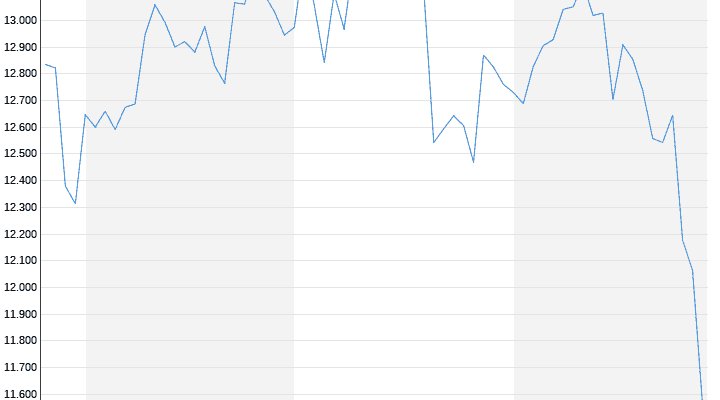Germany is shutting down large parts of the cultural and leisure sector in the fight against Corona. Concern about the economy is taking hold in the economy. Investors sell massively. The downward slide on the stock market is picking up speed.
The fear of a renewed corona lockdown pissed off investors on the German stock market in the middle of the week. And the fears were confirmed: The federal and state governments want to break the second wave of corona infections with strict contact restrictions for citizens and an extensive shutdown of all leisure activities. This was decided by Chancellor Angela Merkel and the Prime Ministers of the federal states. The second coronavirus wave has Europe firmly under control, said economist Alessia Berardi from asset manager Amundi. Governments are under increasing pressure to drastically restrict public life.
As a result, trade collapsed. During trading, the Dax fell to 11,457 points, its lowest level since the end of May. Ultimately, the leading index lost 4.2 percent to 11,561 points. The leading index is now almost 2000 points or around 14 percent away from its interim high at the beginning of September at 13,460 points. The MDax of the 60 medium-sized stock market stocks lost 2.7 percent to 25,884 points.
"Consumption is likely to suffer in any case, and the risk of bankruptcy waves continues to increase," said one market participant. In view of the new measures, "we no longer expect a plus of one percent for the fourth quarter compared to the third as before. Instead, we would be happy about a black zero, whereby the risk of a second recession has increased significantly," says Commerzbank .
However, the term "lockdown" shouldn't become a bad word, warned Thomas Gitzel, chief economist at VP Bank. "A short, strict lockdown can be an opportunity." If the chains of infection were broken, consumers would feel safer again and would not practice voluntary long-term abstinence. However, it has not yet been foreseeable that similarly generous aid packages will be launched this time to cushion the economic consequences of the pandemic, said investment strategist Michael Hewson from brokerage firm CMC Markets.
+++ Read the details of the trading day again here +++
On the stock market, travel and tourism stocks in particular flew out of the depots. This sector suffers particularly badly from pandemic restrictions. The European industry index fell by three percent.
The current reporting season meanwhile set the tone for the individual values. The share of German bank With levies of 1.9 percent held up significantly better. The business figures were better than expected. Citigroup highlighted the strength of the investment business in particular. Commerzbank fell by 3.6 percent.
The asset manager DWS had raised further customer funds in the third quarter. In addition, the Deutsche Bank subsidiary earned more before taxes both year-on-year and in the second quarter thanks to significantly lower costs. For the share it was "only" 0.6 percent down.
Traders were amazed at the price drop of 6.5 percent Beiersdorf. "With the best will in the world, you can't justify that with any corona worries or the conservative outlook," said a trader, referring to the sales figures. But that is exactly what Citigroup did, which attested the consumer goods giant to have a surprisingly conservative outlook. After a strong quarter, this does not imply any further improvement in the fourth.
Delivery Hero were Dax winners with a premium of 1.7 percent. "With the discussion about the second lockdown, the shares would have been the stock market favorites anyway," said one trader. Now this is underpinned with hard facts. The growth is as strong as hoped, in the third quarter the orders doubled compared to the previous year. Accordingly, the sales forecast for the year as a whole has been refined upwards.
Speculations about a drop in demand also sent the oil price down. The variety Brent from the North Sea fell a good five percent to 39.09 dollars per barrel (159 liters). Selling pressure will be exacerbated by rising US inventories, said Harry Tchilinguirian, chief oil investment strategist at BNP Paribas. In the wake of the oil price, the index for European oil and gas stocks slipped by three percent.
At the same time, investors fled to "safe havens" like Federal bonds. This temporarily depressed the yield on ten-year stocks to minus 0.646 percent, the lowest level since March. The world's leading currency was also in demand. The dollar index, which reflects the exchange rate against other major currencies, gained half a percent. This continued that Gold price too, because the precious metal is becoming less attractive for investors outside the US. It was down 1.3 percent to $ 1,881.67 a troy ounce (31.1 grams).
. (tagsToTranslate) Corona measures (t) Corona crisis (t) Pandemics (t) Dax (t) share prices (t) share trading
